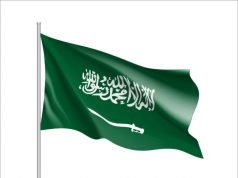The Saudi Arabia, under monarchical governance, has proved one important point to the world: that the convergence of democracy and any other form of government is in the welfare and happiness of the governed.
Yes, democracy is embedded in the dictum of government of the people, by the people and for the people, only to the extent that leaders who discharge the tenet for the welfare and happiness of the rest of the people have the fear of God. The operating word, of course, is the fear of God, without which it becomes meaningless.
And this is where the Saudi Arabia comes in. It is a country that is governed through a family lineage, but, it is a country with leaders who rule with the fear of God; leaders who are always guided by the realization that they will someday, meet a superior being, the creator, to whom they will give account of how they touch the lives of the people they led, and are so guided.
These are the facts that dominated my though when on August 17 this year, the coordinator of the International Communications Centre (ICC), formed to welcome and attend to the visiting international journalists for 2018 pilgrimage, Sheikh Faheem H. Alhamid took about 80 of us, from no fewer than 25 countries, on a working tour of one of the maximum prisons in Saudi Arabia, located in Jeddah, a commercial city of the country.
To start with, the prison is not addressed as ‘prison’ but as Mohammed Bin Naif Counseling and Care Centre, whereas the prisoners are addressed as Beneficiaries. As a matter of fact, every other thing around the prison is fashioned in a way to take the minds of the occupants from the fact that they are prisoners. What about allowing them to receive visitors from outside; what about, wait for it; allowing their wives to visit them and for them to spend three to four nights with the wives in ‘private chalets’ with well-laid bed and beddings, refrigerator stocked with variety of drinks, etc?

The occupants are allowed to socialize with one another, watch television, read newspapers, play games, open bank accounts, visit relations and practice whatever profession they choose among other things.
When we thought it was all over after touring the centre, which is almost a city on its own, we were taken to what should be called nothing less than a specialist hospital in the centre. The medical facilities and state-of-the-art equipment in the hospital can only be compared, if at all they are comparable, to the best specialist hospital in Nigeria. No exaggeration please!
This is an institution that is not only equipped with the best drugs and medicines one can think of, but has nearly all the departments, including standard dialysis with highly qualified medical and administrative personnel on call 24 hours. To think that this is a prison!
The Mohammed Bin Naif Centre, established in 2004 and started operation in 2007, is mainly for reformation, rehabilitation and reintegration of religious hard-liners, extremists, religious bigots, terrorists and those with perverted idea of Islam. It is a correctional institution that deals with correcting thoughts according to specialized scientific systematical ways of relying on the Islamic Shari’ah and human principle.
The would-be beneficiary, who shows the trait of perverted religious ideologies is usually scooped from the communities and taken to the centre from where qualified psychologists take him round various psychological intellectual rehabilitation and promotion.
The mission of the centre is captured thus: “Intellectual rehabilitation and promotion of the national affiliation of those who have fallen into extreme and radical through specialized scientific and practical programmes and contribute to efforts to prevent society from deviant ideas.” And the vision of the centre is: “Pioneering in the processes of intellectual treatment, which is strengthened to the national security system in accordance with the Islamic perspective and humanitarian principles.”

The reformation of the beneficiaries begin with an introduction to arts, which the Saudi government sees as part of the process of rehabilitation, beginning with what is known as Track Definition.
Track is said to be a psychologically and socially guided rehabilitative treatment course for the beneficiaries, using art, with the beneficiaries going through various art processes, such as painting, clay, printing, holographic configuration and even manual imaginative and skill processes. These are aimed at bringing about intellectual, psychological, social, skills and self-change.
The government believes in the heritage of practice of art which is inherent in the sense of freedom, recreation, relaxation, self-focus, the opportunity for privacy and other characteristics.
The counseling programme concept and mechanism take the form of public advice outside the prison, made up of lectures, seminars, scientific meetings; dialogue with families of the beneficiaries, electronic advice through internet and others. There are also religious, psychological, social, art therapies, economic and political programmes. Other programmes are on culture, sport and recreation, services; hospital services with the main contents as health services, laundry, cleaning and phone call services; visits and vacations.
Above all these, the government, through the centre, provides aftercare programme, which is a set of programme that offers to the beneficiaries after graduating from the centre. They are such things as health, social, educational, job and financial aids.
There is the family care programme aimed at strengthening the role of the family to bear its social responsibility towards its child (the beneficiary) and contribute to the preservation of his intellectual and behavioural integrity.
Provision is made for financial assistance to beneficiaries who have successfully passed through all the courses on reformation, rehabilitation and reintegration. The financial assistance are meant to make them not only useful citizens of the country, but respected members of the society that are fully accepted by both the families and the larger society.

The practice of treating even society’s nuisances, such as religious bigots and other criminals with kid’s gloves stands out Saudi Arabia as one country that has willingly promoted human rights beyond ordinary, without compulsion or the niceties about democracy or lack of it.
Like the coordinator of the ICC, Sheikh Faheem said, the government has always believed that every human being is born free and, whatever he or she later does in life should not be used as excuse to deny such human being his or her right to at least, a minimum of decent living.
According to him, the equality with which God created all human beings need not be compromised on the altar of class differences, even though, some do develop unacceptable characters in the process of growing and mingling with others like them. What such social misfits and defiants need is correction through counseling and reformation, he said.
From the way Saudi Arabian authorities handle their bad people, it is safe to infer therefore, that the government has the belief that human being, no matter how far he has gone astray, can be reformed and made decent members of the society without oppressive antics. That has been working well for the country, to a point where every citizen feels safe in the hands of the leaders, and of the next door neighbors.
Such society, at the risk of sounding immodest, can be said to be at peace with itself, its citizens and the neighbours.

This piece was written by our Editor-In-Chief/Chief Executive Officer, Yusuf Ozi Usman. He was among the 80 foreign Journalists that covered this year’s hajj on the invitation of the Saudi Arabian Ministry of Media.






